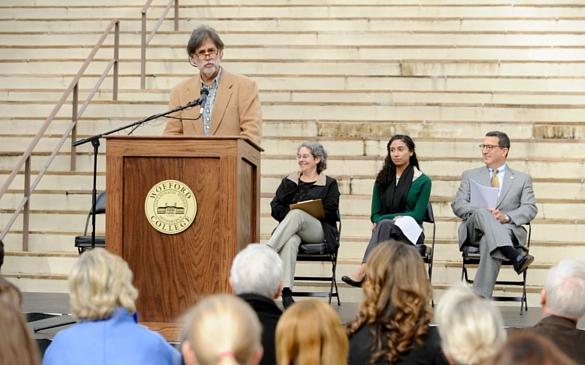By: Sarah Madden, Senior Writer
When the $4.2 million dollar Milliken Sustainability Initiative at Wofford College was announced in December, what Professor John Lane calls “lots of moving pieces” were described and set into motion. In order to combat subsequent misconceptions, Lane highlights several key components of the initiative.
Off-campus housing:
“The big question, with grant and with this living learning community in the Northside, is how are Wofford students going to respond to the first living opportunity outside the bubble?” he says. “When I was up on stage and saw [the grant] announced, I saw a little bit of surprise in some students, and I think part of that is because the living learning community (LLC) was called a dormitory. It’s not a dormitory. It’s a house for 12-15 Wofford students that will live there with a program specialist, like a very hands-on resident director.”
These students will actively study the redevelopment of the Northside, like an on-campus LLC. Unlike others, however, this LLC will be aimed at mostly juniors and seniors including a variety of majors but especially those tied to social sciences.
“I would imagine it would mostly include environmental studies, government, sociology and anthropology majors and Bonner Scholars,” says Lane.
On-Campus Energy:
The grant establishes an energy manager position on campus, allowing the college to collect and interpret data on its energy usage.
“We really don’t know that much about how much energy is wasted or used on campus,” he says. “The grant establishes meters in most of the buildings on campus, measuring input and output. Additionally, there will be a dashboard in each building that will be visible to the students.”
This newly accessible data will be utilized by both students and professors. “The energy manager will work with the new sustainability professor to create classes that use our data. Any savings generated from this project will go back into the sustainability fund, from which students can draw for innovative projects through the SPACE,” says Lane.
Lane hopes that this top-down, administrative approach will make sustainability valued on campus.
“I think that when all the systems are in place (meters, dashboards, energy manager and two professors focused on sustainability), we are going to have a better chance changing the culture of the college and making sustainability central to the culture. Now, it’s peripheral.”
In the past, the burden has fallen on the environmental studies department or even specific students to address sustainability issues, but this is changing, says Lane.
“Moving our board and upper administration to appreciate sustainability at a campus-wide level is a long process. Most of the decisions that are made are economical, at any institution. For example, most of the sustainable features of our buildings posted on the [Wofford] website are outdated, because these features are just what you do because they are code, now. We still only have 2 LEED certified buildings on campus.”
The logistics of prioritizing sustainability on campus are complicated, he says.
“You’ve got a budget, and you’ve got a process, and the budget and the project get out of line along the way. The environmental ‘features’ usually get cut pretty early on in the process.”
He emphasizes that this cultural shift is a long and slow one.
“It’s hard to move a school… like a battleship.”
Timeline:
According to Lane, the professor of human and community sustainability will be hired “by the first of April, probably.”
Nine candidates have been selected to visit campus in the following month for further evaluation.
“The Northside [LLC] Initiative is in the works. It will probably be 2017 when the first LLC moves in, maybe Spring of 2018.”
The Energy manager position will be filled between now and fall of 2016, and meters and dashboards will be installed by then as well.
A second environmental professor, who works closely with the energy manager and whose emphasis will be in sustainability, will most likely be hired next spring, as the search will begin in fall of 2016.
The program specialist for the Northside LLC will be a full-time, resident-director type job, says Lane.
“This person will live there, which may include a family. They will be involved in the day-to-day running of the program.”
This position will be filled around the same time as the human and community sustainability professor, in the near future.























